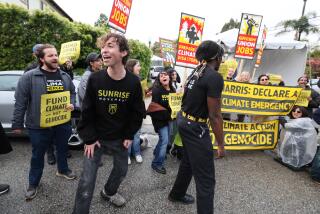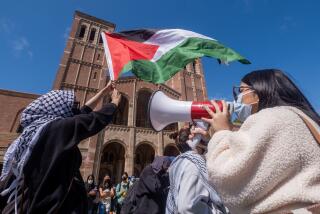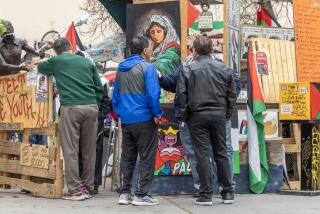Anti-War Activists Call Clinton Role Peripheral : Protests: Many who now support nominee say he sought moderate path, was more interested in politics.
- Share via
WASHINGTON — The gathering was at an estate on Martha’s Vineyard in the summer of 1969. It was, by the account of participants, a reunion of veterans of the 1968 Eugene J. McCarthy presidential campaign for a few days of swimming and touch football.
Among the hundreds traveling to the island off the Massachusetts coast was a young Southerner named Bill Clinton. He seemed more politically conservative than most, a bit mistrusted by those at the reunion who were firmly committed to the anti-war protest movement. “He was much more on the political operative side than the protest side,” recalls author Taylor Branch.
Now, President Bush’s campaign is focusing on this and other events from more than two decades ago in a bid to draw attention to the Democratic presidential nominee’s role in the Vietnam anti-war movement and raise questions about his character.
In a series of television appearances and press releases this week, Bush campaign officials have spotlighted Clinton’s anti-Vietnam days, in effect broadening their earlier attack on his attempts to avoid being drafted and on his visit to Moscow while a Rhodes scholar at Oxford.
Clinton “played fast and loose with his 1969 visit to Martha’s Vineyard, to meet with anti-war activists,” said an official Bush-Quayle campaign press release earlier this week.
Mary Matalin, Bush’s deputy campaign manager, also sought to blink Clinton’s opposition to the Vietnam War to a trip he made to Moscow as a tourist at the end of 1969. “It is absolutely germane to the voting public to know precisely why Bill Clinton traveled to the heart of enemy territory at the height of the war,” she said.
Clinton, now 46, was not unusual in opposing the Vietnam War or publicly demonstrating against it. At one time or another, more than 4 million Americans took part in protests against the far-off conflict, according to a 1984 book on the movement. Despite considerable pressure from then-President Lyndon B. Johnson in the late 1960s, the CIA found no evidence that the anti-war movement was directed or influenced by any foreign powers.
“We felt, and believe to this day, that we were deeply engaged in patriotic activities, because we were afraid the country was being torn apart by a war we felt was not in the country’s interest,” says John Shattuck, who was among those attending the reunion on Martha’s Vineyard and who now is a vice president of Harvard University.
Clinton did possess an unusual amount of knowledge about foreign policy for a college student. He had been an aide to then-Sen. William Fulbright of Arkansas, chairman of the Senate Foreign Relations Committee, while a student at Georgetown University in Washington from 1964 to 1968. Fulbright was one of the leading critics of the Vietnam War.
Those who knew Clinton at the time generally say he became involved in anti-war organizing activities in the summer and fall of 1969, but participated on the periphery. These friends and acquaintances, most of whom now count themselves as supporters of his presidential bid, say they saw him then as someone who sought a peaceful, moderate path of protest.
In 1968, the first year of his Rhodes scholarship in England, Clinton seems to have been politically inactive. At the time, Republican presidential candidate Richard M. Nixon was assuring voters that he had a plan to end the war, and many Americans hoped it would be over soon. Clinton had just turned 22 years old.
“To my knowledge, in the school year of 1968 to 1969, Bill Clinton did not organize and lead anti-war protests, or even participate in them,” says fellow Rhodes scholar Cliff Jackson, the Arkansas attorney who has become one of Clinton’s prime adversaries in the disputes over his draft record.
That first year was more a time of studying and extracurricular activities--like seeking out Indian and Chinese restaurants and hitch-hiking around England--than anti-war activism, recalls Thomas S. Williamson Jr., another Oxford classmate and now a Washington attorney. “The whole first year, (protesting the war) wasn’t something we did,” Williamson says. “We were mainly graduate students.”
Clinton returned to the United States for the summer in 1969, as the war continued under the Nixon Administration and the American public grew increasingly impatient to end it.
It was during this period that Clinton became involved in anti-war activities. And when the alumni of the campaign that then-Minnesota Sen. McCarthy had based on his opposition to the war gathered at the Martha’s Vineyard home of John O’Sullivan, a former campaign worker-turned-Rhodes scholar named Rick Stearns brought his friend Bill Clinton.
Asked about the gathering during an appearance Tuesday on the Phil Donohue show, Clinton said he went there “because I was a Southerner who was sympathetic with the people who worked for McCarthy.”
The Bush campaign press release issued earlier this week said that Clinton went to Martha’s Vineyard to meet with anti-war activists. But several of those who were at the event say it was not called for the purpose of anti-war organizing and that the group devoted little or no time to that purpose.
“What this really was was a lot of 20- to 25-year-olds, impressed by the fact that we had had a role to play in the (1968) campaign, which hadn’t happened a lot before or since,” said Branch, who knew Clinton at the time but has not talked to him for a decade. “It was networking, is what it was. . . . There were a lot of people like Clinton. Yes, they were against the war, but they were more interested in politics.”
Some of those at the reunion subsequently went on to organize the massive anti-war demonstrations in Washington, D.C., in October and November of 1969. By the recollection of Los Angeles political activist David Mixner, who was then an anti-war organizer, Clinton worked as a volunteer for a time in the Washington office that organized these protests.
Said Mixner, who is now a strong Clinton backer: “He was in Washington for a few weeks in the summer of ’69. . . . He was not a major or a minor figure in the movement. . . . He was the conservative. In many ways, he was mistrusted by many of the organizers, because he was struggling with whether to serve” in the armed forces.
That fall Clinton returned to Oxford, where he was among more than 1,000 demonstrators who staged an anti-war protest outside the American Embassy in London, as vastly larger protests were taking place in Washington.
The Rev. Richard McSorley, a peace activist who is head of the Center for Peace Studies at Georgetown, told the Washington Times newspaper this week that Clinton “was one of the main organizers of the American Embassy protest.”
Robert B. Reich, a Harvard University professor and key economic adviser to Clinton’s campaign who was at Oxford with the candidate, recalls such efforts as informal in nature. He says: “What I remember is that many of us--Bill included--did a lot of telephoning to other Americans, alerting them to the time and place of marches. That was the meaning of organizing.”
Clinton himself said this week that the only war protest he organized while attending Oxford was a “teach-in” at the University of London. “That’s the only thing that I ever helped to put together.”
Stephen C. Engstrom, now a Little Rock, Ark., attorney, recalls visiting a friend on the Oxford campus in the fall of 1969 and attending a meeting of American students who were discussing an upcoming Vietnam War protest.
“There were some pretty radical views being voiced, and there were some conservative views being voiced,” Engstrom said in an interview. “Clinton kind of took on a moderator’s position, if anything.”
Williamson said that he and Clinton served as marshals at a protest--he can’t recall if it was the march outside the U.S. Embassy--and basically were supposed to help people file along the protest route. “We were asked to stand in particular places to help ensure that it would be a peaceful demonstration, which it was,” he said.
In mid-1970, Clinton returned from Oxford to the United States, where he attended Yale Law School. While many other Americans continued to take part in anti-war efforts such as the May Day demonstrations in Washington in 1971, Clinton was already gravitating to electoral politics. In 1970, he helped run the Senate campaign of anti-war candidate Joseph Duffy in Connecticut, and in 1972 he became the Texas state director for the presidential campaign of George S. McGovern.
Many who knew Clinton during the period remember that he seemed to be planning a political career.
Even back at Martha’s Vineyard, Shattuck says, Clinton “was definitely a guy interested in mainstream electoral politics.”
Times staff writers Douglas Frantz and David Lauter contributed to this story.
More to Read
Sign up for Essential California
The most important California stories and recommendations in your inbox every morning.
You may occasionally receive promotional content from the Los Angeles Times.













